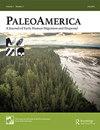三叶草通过大桑迪对阿拉巴马州北部年轻旱莲的技术响应
IF 1.7
Q1 ANTHROPOLOGY
引用次数: 4
摘要
摘要Kuhn和Miller(2015)认为,射弹点寿命历史的变化可能是由于(a)原材料获取有限导致的更换成本增加,或(b)平均狩猎回报率下降。在阿拉巴马州北部,原材料的获取可以保持不变,我们利用生物结构的变化来预测年轻Dryas(12900–11700日历年前)过程中Clovis到Big Sandy抛射点的生活史。然后,使用阿拉巴马州古点调查和私人收藏的数据,我们发现随着时间的推移,射弹点的大小有所减少,并且重新打磨也有所波动。这些趋势伴随着森林结构、平均猎物大小和狩猎回报的变化。我们得出的结论是,与年轻Dryas的出现同时,没有突然的技术变化。然而,随着新Dryas的终点和随后的全新世变暖,阿拉巴马州北部的觅食者在射弹点技术方面做出了重大改变。本文章由计算机程序翻译,如有差异,请以英文原文为准。
Clovis through Big Sandy Technological Response to the Younger Dryas in Northern Alabama
ABSTRACT Kuhn and Miller (2015) suggest that changes in projectile point life histories could result from (a) increased replacement costs due to limited raw material access, or (b) a decline in average hunting returns. In northern Alabama, where raw material access can be held constant, we use variation in biotic structures to make predictions for life histories of Clovis to Big Sandy projectile points over the course of the Younger Dryas (12,900–11,700 calendar years ago). Then, using data from the Alabama Paleo Point Survey and private collections, we find a decrease in projectile point size through time, and fluctuations in resharpening. These trends follow changes in forest structure, average prey size, and hunting returns. We conclude that there are no abrupt technological changes coeval with the Younger Dryas onset. However, with the Younger Dryas terminus and subsequent Holocene warming, foragers in northern Alabama made significant changes in projectile point technology.
求助全文
通过发布文献求助,成功后即可免费获取论文全文。
去求助
来源期刊

PaleoAmerica
Earth and Planetary Sciences-Paleontology
CiteScore
3.70
自引率
0.00%
发文量
15
期刊介绍:
PaleoAmerica disseminates new research results and ideas about early human dispersal and migrations, with a particular focus on the Americas. It fosters an interdisciplinary dialog between archaeologists, geneticists and other scientists investigating the dispersal of modern humans during the late Pleistocene. The journal has three goals: First and foremost, the journal is a vehicle for the presentation of new research results. Second, it includes editorials on special topics written by leaders in the field. Third, the journal solicits essays covering current debates in the field, the state of research in relevant disciplines, and summaries of new research findings in a particular region, for example Beringia, the Eastern Seaboard or the Southern Cone of South America. Although the journal’s focus is the peopling of the Americas, editorials and research essays also highlight the investigation of early human colonization of empty lands in other areas of the world. As techniques are developing so rapidly, work in other regions can be very relevant to the Americas, so the journal will publish research relating to other regions which has relevance to research on the Americas.
 求助内容:
求助内容: 应助结果提醒方式:
应助结果提醒方式:


